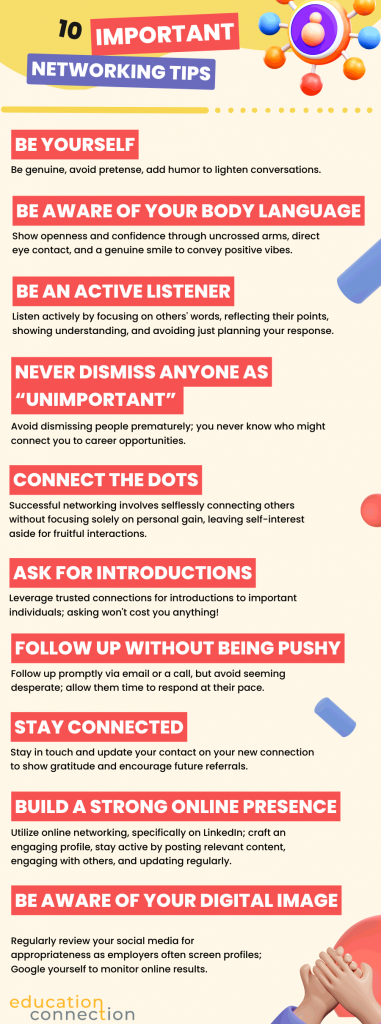Table of Contents
It’s not enough to simply send out your resume and hope for offers to come your way. In today’s job market, knowing someone could be the best way to get your foot in the door. The key is to connect with contacts who are relevant to your industry—and the type of career you’re pursuing. Luckily, there are plenty of solid strategies to help you cultivate a professional network and open up potential career opportunities.
When to Start Networking
The sooner you start networking, the better. In fact, a good time to take advantage of networking opportunities is while you’re still in school. That’s because you are likely surrounded by large pools of people who are interested in pursuing careers in related fields and by professors who could be invaluable sources for building new professional contacts.
In addition, if your school offers clubs or groups related to your industry of choice, joining one or more of them might be a great way to practice your business networking skills. Another option is to volunteer or intern at a company that’s relevant to your career goals—you could make connections with people in your industry who might eventually lead you to a job opportunity once you graduate.
How to network
The first step to networking successfully almost always begins with striking up conversations with strangers. There’s no getting around it. Often the hardest part is making that first contact—an easy way to do that is to jump in and introducing yourself. Then, it’s time to find common ground and learn more about the person by asking questions. You’d be surprised to find how much people enjoy talking about themselves if you give them the chance!
However, it’s not enough to just meet new people. You have to maintain relationships if you’re looking to build potential resources for future employment searches.

10 important networking tips
Now that you’re more familiar with how to network, it’s time to explore some strategies to become more effective at it. Some of these tips may seem obvious, but it’s easy to throw them by the wayside when you’re actually in conversation.
1. Be yourself
Many people can spot a phony, so be authentic. Show your true self rather than trying to put on a front to impress others. And don’t be afraid to add some humor into the conversation to lighten things up.
2. Be aware of your body language
It’s important that you appear open and confident in your body language. That means keeping your arms uncrossed, making direct eye contact, and, of course, giving off positive vibes with a genuine smile.
3. Be an active listener
Being a good listener entails really paying attention to what people are saying rather than just thinking about how you might respond. A good tip to try is to repeat the other person’s point in your own words. This shows that you are listening and that you understand what they are saying.
4. Never dismiss anyone as “unimportant”
A big mistake people often make is to write off others before getting to know them. You never know who could introduce you to your next boss—or be your next boss.
5. Connect the dots
A huge part of being a successful networker is to help other people connect, even if there’s nothing that is obviously in it for you. It’s important to be a giver and not a taker. In other words, leave your personal agenda at the door. If you go into conversations only thinking about what you might get from the other person, you’re doomed to fail.
6. Ask for introductions
One of the best ways to connect with important people is to be introduced by someone that they already trust—so don’t be afraid to ask. You have nothing to lose!
7. Follow up without being pushy
It’s always a good idea to follow up with a timely email—or even a chat on the phone. Just be wary of coming off as too desperate if you aren’t able to connect initially. Give the person time to respond on their own terms.
8. Stay connected
If you get a referral from one of your contacts, make sure to keep in touch about how the new connection is going. This could show your appreciation for the introduction typically help make it more likely that the referrals will continue.
9. Build a strong online presence
Tapping into online networking resources is pretty much a must in this digital age. Construct a professional and comprehensive LinkedIn profile with a compelling headline and a high-quality profile picture. Don’t just passively wait for others to see your profile—post industry-relevant content on your LinkedIn feed, engage with other’s content, participate in LinkedIn groups, and make sure to keep your profile up to date.
Consider engaging in other social media platforms as well. There are hundreds of them out there, and some are particularly relevant to specific industries. For example, platforms such as Instagram, Behance, Pinterest, or Tumblr could be particularly beneficial for those in the visual arts. Software developers might check out Stack Overflow or Find Nerd.
10. Be aware of your digital image
Review all your current social media profiles to ensure they don’t include anything inappropriate or offensive—some employers check social media sites as part of their screening process. Also, Google yourself frequently to see the kinds of results that are generated.
It’s understandable that putting yourself out there might feel intimidating. But building both your professional and social contacts could be a great way to expose yourself to people who could help further your career ambitions. Being comfortable and confident in your interactions with others is also a skill that could take you far in business, regardless of whether or not you’re looking for new job opportunities. So get yourself out there and remember to pay it forward!

